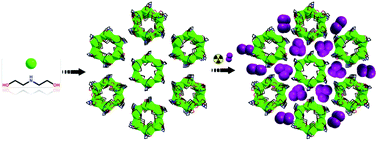The advantage of macrocyclic entities lies in their vital implications for host–guest chemistry. We demonstrated a noteworthy assembly of aluminum molecular rings for iodine capture. The one-pot synthesis led to production of a family of nanosized rings spanning from six- to 12-membered. They were able to remove iodine from cyclohexane solutions rapidly with a high removal rate, with larger rings (AlOC-61) exhibiting better loading capacity than smaller ones (AlOC-63). Density functional theory (DFT) calculations were carried out to provide further insight into the nature of iodine binding. –OH groups and diethanolamine ligands were the favorable adsorption sites for the iodine guest. DFT calculations also suggested that the exposed –OH groups in AlOC-61 enhanced the affinity for iodine with high adsorption energy. Our study provides important findings for development of new macrocyclic compounds, host–guest chemistry and management of nuclear waste.
